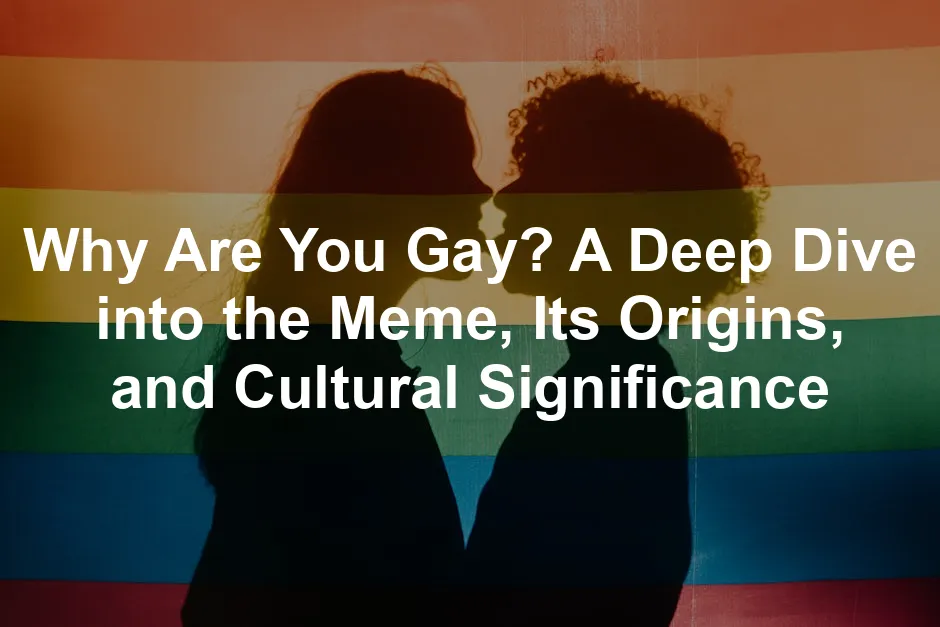
Why Are You Gay? A Deep Dive into the Meme, Its Origins, and Cultural Significance
Introduction
In 2012, a seemingly innocent question during a Ugandan television interview set the internet ablaze: “Why are you gay?” This phrase, uttered by a journalist, quickly morphed into a meme that sparked laughter and deep conversations worldwide. On the surface, it appears humorous. However, it reveals a tangled web of societal attitudes toward sexuality, identity, and the LGBTQ+ community.
Pepe Julian Onziema, an LGBTQ+ rights advocate, was the subject of this interview. His earnest responses starkly contrasted the journalist’s incredulous questioning. This moment became a meme, highlighting a glaring disconnect between the lived experiences of LGBTQ+ individuals and societal perceptions.
Why did this question strike a chord? It shone a light on the absurdity of questioning someone’s identity as if it were a choice. The meme quickly transcended its original context, becoming a symbol in discussions about acceptance and understanding.
The humor derived from the clip is layered. While people chuckled at the awkwardness, many also recognized the underlying critique of homophobia and ignorance. “Why are you gay?” isn’t just a source of amusement; it opens a window into the broader challenges faced by the LGBTQ+ community, especially in environments hostile to their existence.

As we unravel this meme’s journey, we’ll explore its origins, the experiences of those involved, and its cultural significance. The objective here isn’t simply to entertain but to foster understanding. Because grasping why someone is gay involves more than just laughter; it’s about recognizing the struggles and triumphs of acceptance and awareness. So, let’s embark on this exploration of humor, culture, and advocacy together. After all, understanding the question goes beyond mere amusement—it calls for empathy and insight into the lives of many.
The Origins of the Meme
The Interview Context
In December 2012, a Ugandan television show called Morning Breeze hosted a lively debate featuring Pepe Julian Onziema, a prominent LGBTQ+ rights advocate. The interview was meant to highlight the challenges faced by sexual minorities in Uganda. But it took a bizarre turn when the journalist, Simon Kaggwa Njal, posed the now-infamous question, “Why are you gay?”
The context of this question was crucial. Uganda is known for its harsh stance against homosexuality, largely fueled by cultural norms and some media portrayals. The Ugandan media often amplify anti-LGBTQ+ sentiments, framing homosexuality as a foreign influence that threatens “traditional” values. This environment made Onziema’s presence on the show even more significant. He wasn’t just an advocate; he was a beacon of hope for many facing discrimination.
The interview quickly became a spectacle as Njal’s incredulous tone and facial expressions contrasted sharply with Onziema’s calm demeanor. Viewers were captivated by the clash of perspectives, but it also reflected a broader societal discomfort with LGBTQ+ identities. As the clip circulated online, it became a lens through which many began examining the absurdity of questioning someone’s identity in such a dismissive manner.

The Birth of a Meme
The question “Why are you gay?” caught fire on social media, morphing into a meme that transcended its initial context. Memers quickly seized upon the absurdity of the situation. They found humor not just in Njal’s questioning but also in its implications about societal homophobia.
What started as a serious dialogue about LGBTQ+ rights turned into a viral sensation. Various iterations of the meme emerged, often remixing the original clip with captions that highlighted the awkwardness or poked fun at stereotypes surrounding masculinity and sexuality. The phrase itself became shorthand for discussions about identity, acceptance, and social norms.
Key moments in the meme’s evolution included remixes that juxtaposed the original clip with comedic situations, showcasing how memes can amplify serious issues while also serving as a vehicle for humor. As the meme spread, it became a part of internet culture, with users embracing both the humor and the critique embedded in it. Yet, while the meme provided a source of amusement for many, it also glossed over the serious implications of the original interview, which included the gaslighting experienced by Onziema at the hands of the journalist.

The transformation from a serious discussion to a comedic meme highlights an interesting duality. On one hand, it opened avenues for people to engage with LGBTQ+ issues in a lighter way. On the other hand, it risked trivializing the struggles of those like Onziema, who faced real threats due to their identity. This complex interplay between humor and social commentary illustrates how memes can both reflect and shape public discourse, making the “Why are you gay?” meme a fascinating study in cultural dynamics.
The Reactions and Implications
Public Reception
The public reception of the meme was a mixed bag of laughter and discomfort. On one side, countless users found the original clip hilarious. They laughed at the absurdity of the question and the journalist’s uninformed stance. Yet, on the other side, many recognized the uncomfortable truth behind the humor—the real pain and struggles faced by LGBTQ+ individuals in Uganda.
This duality of laughter and discomfort made the meme a point of contention. While some saw it as a source of comedic relief, others understood that it could perpetuate harmful stereotypes. The natural inclination to laugh at the absurdity of the situation must be weighed against the reality of what Onziema represented: resilience in the face of adversity.
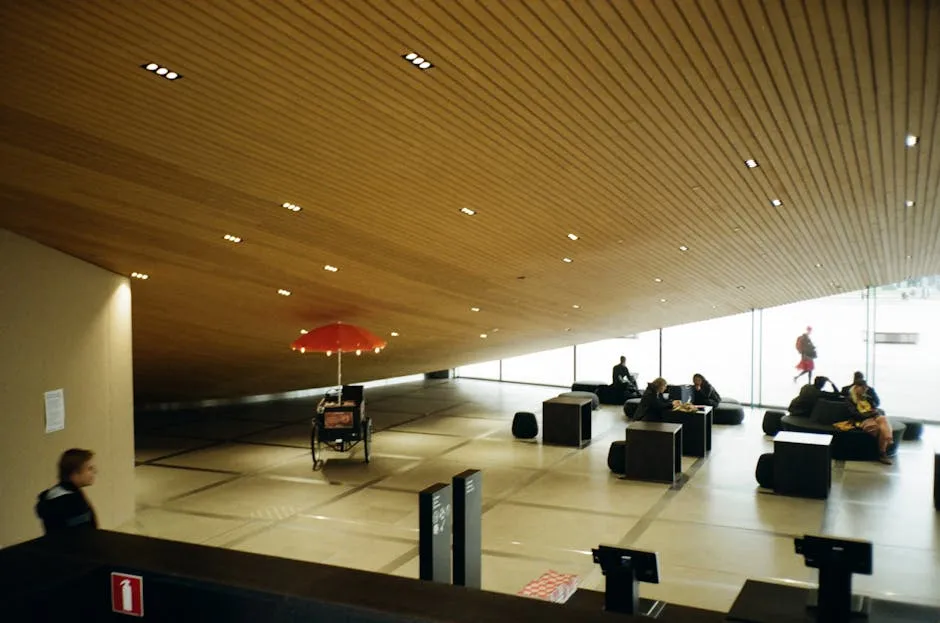
As the meme continued to circulate, discussions surrounding it began to evolve. People started to reflect on the ethical implications of using someone’s struggles for entertainment. The question remained: at what point does humor become harmful? The reactions to the meme served as a catalyst for deeper conversations about identity, acceptance, and the often thin line between comedy and insensitivity.
This exploration of public reception highlights the necessity for sensitivity and understanding in discussions about LGBTQ+ issues. While humor can be a powerful tool for advocacy, it must be used responsibly, ensuring that the voices of marginalized communities remain central to the conversation.
Gaslighting and Misrepresentation
In the infamous Morning Breeze interview, Pepe Julian Onziema faced a barrage of gaslighting. The journalist, Simon Kaggwa Njal, openly questioned Onziema’s identity. His incredulous tone suggested that being gay was a choice. This undermined the legitimacy of Onziema’s experiences. Gaslighting, in this context, creates a dangerous narrative. It invalidates the identities of LGBTQ+ individuals, feeding into societal prejudices.

The role of the journalist is pivotal. Media figures hold power in shaping public perception. Njal’s questioning not only misrepresented Onziema but also reflected broader anti-LGBTQ+ sentiments. Such media portrayals can have dire consequences. They perpetuate harmful stereotypes and influence societal attitudes. Ethical journalism should seek to uplift marginalized voices, not diminish them. In Onziema’s case, the interview became a vehicle for ridicule rather than understanding. This incident underscores the importance of responsible media representation in advocating for human rights.
Toxic Masculinity and Societal Norms
The “Why are you gay?” meme inadvertently highlights toxic masculinity. It reflects societal pressure to conform to rigid gender roles. The meme serves as a lens through which we can examine these damaging attitudes. The absurdity of the original question illustrates how society often views masculinity. It suggests that vulnerability or non-heteronormative identities are inherently laughable.
Humorous adaptations of the meme have emerged. These often poke fun at male bonding and tenderness. However, they can reinforce harmful stereotypes. For instance, jokes about male friendships that involve tenderness may unintentionally mock genuine affection. By doing so, they perpetuate the idea that emotional expression is weak. This is where the joke becomes problematic. While it sheds light on toxic masculinity, it also risks trivializing the real struggles of individuals like Onziema.

In essence, the meme reflects a cultural misunderstanding. It perpetuates a cycle where laughter often overshadows genuine discussion. Society needs to address these norms critically. Shifting the narrative from mockery to understanding is essential for progress. By recognizing the complexities of masculinity, we can foster a more inclusive dialogue about identity.
The Importance of Visibility
Visibility plays a crucial role for LGBTQ+ individuals, especially in repressive environments. It can be a double-edged sword. On one hand, being visible can lead to acceptance and representation. On the other, it may invite hostility and discrimination. In Uganda, where anti-LGBTQ+ sentiments run high, visibility is fraught with danger. Advocates like Pepe Julian Onziema brave these challenges to promote understanding and rights.
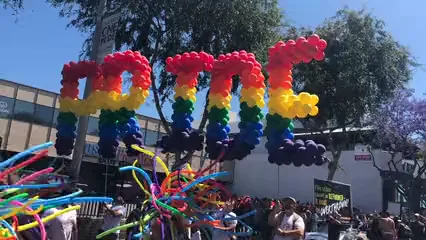
Pride celebrations provide a platform for visibility. They foster community and solidarity among LGBTQ+ individuals. These events also educate the public. They challenge misconceptions and stereotypes. For many, pride is a chance to proudly express their identity. It empowers individuals to stand against oppression. Such celebrations highlight the importance of acceptance within society. They show that love, in all its forms, deserves respect. You can also show your pride with a stylish Pride Flag that stands out at any event!
Advocacy groups work tirelessly to change societal attitudes. Their efforts can help shift public perception through awareness campaigns. When people see LGBTQ+ individuals living authentically, it humanizes their experiences. This visibility can lead to a ripple effect, encouraging broader acceptance.
The Future of LGBTQ+ Advocacy
The future of LGBTQ+ advocacy is full of challenges and victories. In Uganda and beyond, activists continue to fight for equal rights. The battle against oppressive laws remains ongoing. For instance, the Anti-Homosexuality Act of 2014 sparked international outrage. Activists like Onziema played key roles in challenging such legislation. Their courage inspires others to advocate for change.
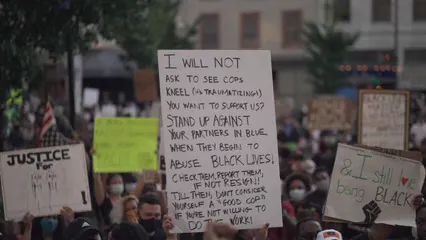
Progress is not uniform. Some regions see advances in rights while others regress. Awareness and education are vital. They help combat discrimination and promote understanding. The international community’s support is also essential. Allies can amplify the voices of LGBTQ+ individuals. They can push for policy changes and challenge harmful norms.
Allyship goes beyond mere support. It involves active engagement in advocacy. Allies must listen and learn from LGBTQ+ experiences. This connection fosters empathy and encourages action. When allies stand up for marginalized communities, they help create a more inclusive world. You can show your support with Rainbow Wristbands that symbolize your commitment to equality!
In summary, the path forward requires a united front. Advocacy remains essential to dismantling prejudice. Together, we can work towards a future where everyone, regardless of their identity, can love freely and authentically.
Conclusion
The meme “Why are you gay?” serves as both a source of humor and a stark reminder of the challenges faced by the LGBTQ+ community. While it may elicit laughter, it also unveils critical discussions about acceptance, identity, and the influence of media on societal perceptions. As we continue to engage with this meme, let us remember the individuals behind the humor and the ongoing fight for equality and respect.
Understanding this question goes beyond mere amusement. It calls for empathy, awareness, and advocacy for those seeking a world where love is celebrated in all its forms. The journey from humor to understanding reflects the complexities of LGBTQ+ identities. It emphasizes the need for visibility and representation in society.
Pepe Julian Onziema’s story encapsulates this struggle. His bravery in the face of adversity inspires countless individuals. Onziema’s work highlights the importance of advocacy in changing hearts and minds. Every pride celebration, every rally, and every discussion contributes to a more inclusive society. You can also enjoy a cozy night in with a Rainbow Throw Blanket while watching LGBTQ+ themed content!
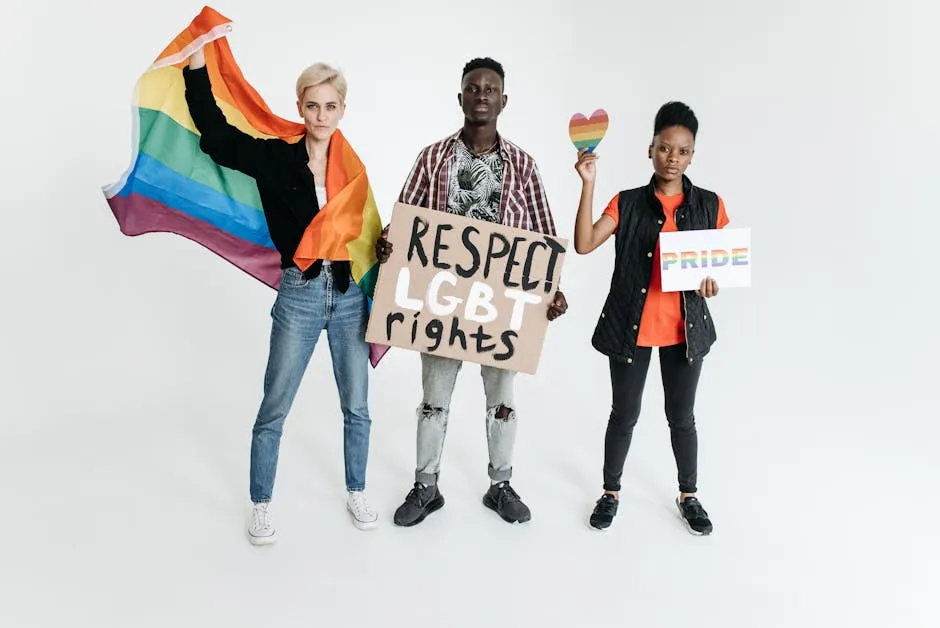
As we reflect on the meme, let’s not forget the real people it represents. Behind the laughter lies a powerful narrative of resilience and courage. The fight for LGBTQ+ rights is far from over. It requires our collective effort to ensure that everyone can live authentically without fear. In this pursuit, we must embrace love, diversity, and the right to be oneself.
FAQs
What does the meme “Why are you gay?” mean?
The meme “Why are you gay?” originated from a Ugandan television interview in 2012. During this broadcast, journalist Simon Kaggwa Njal posed an incredulous question to LGBTQ+ rights advocate Pepe Julian Onziema. Njal’s tone suggested disbelief that anyone could be gay, implying it was a choice. This moment struck a chord, sparking laughter and debate globally. The absurdity of the question highlights societal ignorance about sexual orientation. It became a meme, used humorously yet critically to address homophobia and the often ridiculous nature of questioning someone’s identity.
Who is Pepe Julian Onziema?
Pepe Julian Onziema, born on November 30, 1980, in Uganda, is a prominent LGBTQ+ rights activist. He began his advocacy work in 2003 and currently serves as the Program Director of Sexual Minorities Uganda (SMUG), an organization dedicated to supporting sexual minorities. Onziema gained international recognition after the infamous interview on *Morning Breeze*, where he faced gaslighting from the journalist. Despite facing multiple arrests and violence for his activism, Onziema remains committed to fighting for LGBTQ+ rights in a challenging environment. He has received accolades, including being named a Global Citizen by the Clinton Global Initiative in 2012.
Why is the meme significant?
The “Why are you gay?” meme is significant for several reasons. Firstly, it reflects the ongoing struggle for LGBTQ+ acceptance and understanding. The humor derived from the meme often masks deeper societal issues, such as homophobia and ignorance. It serves as a conversation starter, forcing people to confront their biases and assumptions about sexuality. Moreover, it highlights the cultural climate in Uganda, where being gay can lead to severe repercussions. This meme has become a symbol of resilience and advocacy, reminding us that humor can spark critical discussions about identity and acceptance.
How can I support LGBTQ+ rights?
Supporting LGBTQ+ rights can take many forms, both locally and globally. Start by educating yourself about LGBTQ+ issues and the challenges faced by this community. Attend pride events or rallies to show your support and solidarity. Volunteer with or donate to organizations that advocate for LGBTQ+ rights, like Sexual Minorities Uganda. Use social media platforms to amplify LGBTQ+ voices and share educational content. Engage in conversations about acceptance and inclusivity, challenging homophobic attitudes when they arise. Lastly, consider advocating for policy changes that promote equality and protect LGBTQ+ individuals from discrimination and violence. Every action counts in the fight for justice and acceptance.
Please let us know what you think about our content by leaving a comment down below!
Thank you for reading till here 🙂 And don’t forget to check out our LGBTQ+ History Book for more insights!
All images from Pexels




